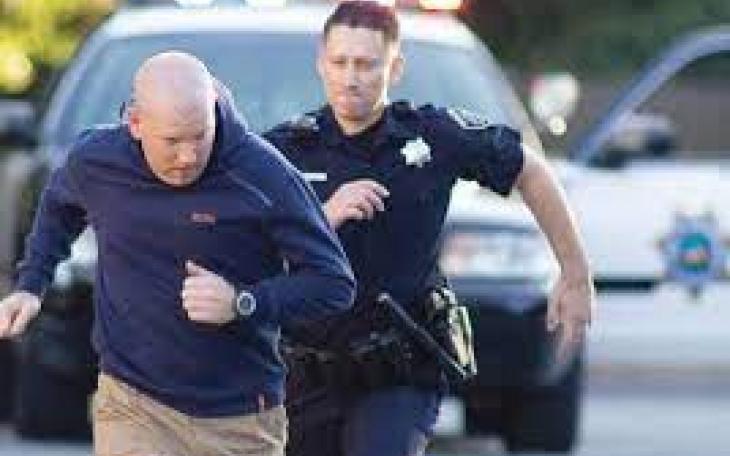Everyone’s seen it: piles of trash, broken glass, graffiti and even pop-up tents littering the cactus-marked lot behind the Hyundai dealership and the underside of bridge on Houston Harte’s access over the Concho River. At Central’s lunch time, clusters of teens can be seen making exchanges: purchasing cigarettes from passersby, tossing fast food bags to the wayside and making deals for dope, sex and other activities they wouldn’t want their parents to know about. This stretch has long been a problem area, and after almost a year of tireless effort, one man is intent on cleaning it up.
Meet SAPD Patrol Officer Charles Barker. A former military cop, Barker hails from Aransas Pass and joined the Air Force when he was 18. It wasn’t his first choice of career path, but in retrospect he doesn’t regret the decision.
“I was a police officer in the military,” he said, adding that he really wanted to be a cop but hadn’t yet turned 21. “I joined the military and I’m glad I did. It put me in the right direction, made me a better person.”
With a wife from San Antonio and a childhood near Corpus, Barker left the military unsure of where his family would go. When plans for a civilian job fell through, he began applying for a position in his dream career, and got it.
“I retired and was supposed to get a job as a military civilian and the civilian workforce fell through,” he says. “I had initially put in for this job not thinking I was going to get this—I had that one lined up—and then I was like, ‘Wow, I completed this step’….It’s like six steps to get hired, and I was like ‘Wow, I’m on the fifth step,” he recalls.
In September 2009, Barker’s application was accepted and he joined the San Angelo Police Department. “I always wanted to be a cop, my whole career,” he said. “I had the chance and applied and here I am. It’s kind of a dream.”
Barker works in Sector 1, which encompasses everything north of Houston Harte. That little patch of land on the Concho technically is the meeting point of all three city sectors, but Barker has made it a priority. The reason, he says, is the kids. The motivation, his own son.
On any given school day, students from Central and drifters from Carver can be seen grouped along the riverbank in a sea of broken glass. Imagine 300 40-ounce bottles, smashed and strewn about, Barker details, trash, paper fast food bags, graffiti messages about selling dope and transients passing off tobacco to kids for a few dollars. The area has been a lot to handle, but Barker tries to keep a consistent watch.
“I’ll see these transients giving them cigarettes or money exchange,” he says. “I saw a lot of hand transactions last time; I actually saw—I didn’t wait long enough, but I’m assuming it was prostitution with a 16-year-old girl, she had her zipper down…with another high schooler.
“She was facing him, I’m pretty sure they were about to do something and the one guy was smoking marijuana, so we went down, ‘What are you doing down here? Why is your zipper down? Who are these people?’” he re-enacts the scene. “‘Oh, these are my homeboys’. She had a tattoo of a crown on her leg—16-years-old. ‘What gang are you in?’ She’s in the kings, she’s a gang member. Sixteen-years-old with a tattoo.” Barker’s voice carries a tone of disappointment.
For about 10 months, Barker has been focusing on the area, and has made some significant progress, but after the first clean up effort the area fell back to the wayside, he said. The second time it was cleaned up, it had gotten worse.
“Pictures don’t describe it,” he says, pulling out his phone as evidence. “You can imagine, there’s feces, there’s pee—the next tent over had probably 50 bags of kitty food. When I went up there, cats just scattered.”
The tent had been set up within feet of the river, a neighboring tent a few feet further. A few paces away from each lie the Concho River, and given the state of the area around the tents, one could imagine what kinds of things were seeping into the water.
“Really what my concern was—what I took personally—we’ve got obviously a water shortage, you can tell by the Concho River. I saw today furniture the size of two large tables thrown into the Concho River and it’s submerged right now behind an apartment complex, he said.
“You have all this drug activity, needles, drug activity, you name it, it’s down there, and that’s right by the Concho River,” he said. “These transients are living there—where do you think they’re throwing their pee bottles, where do you think they’re peeing at, urinating and defecating. The river is just five feet away. That was the biggest concern. That river leads to other places.”
The area had gotten pretty bad when Barker and another officer, Timothy Coffman, took notice and began writing SARA reports, or reports written on areas where officers notice consistent and serious problems. Around this time, City officials also took notice and the officers began an initiative to clean the area up.
Sliding past a few photos on his phone, Barker shows one of a cleared space under the same bridge, where fresh gray patches of paint cover up the once vulgar scripts sprayed on by individuals with unique spelling skills.
Litter and glass have been removed, and evidence of how it once looked has all but vanished. “We cleaned up all this, we kicked all the transients out,” he says, still showing the picture. “I’m in the process of getting no trespassing signs—but finally we’re getting progress here, we just need funds for it.
The picture is a vast improvement upon the previous two, and the area looks safe enough to traverse without wondering what you’ll catch if you trip and fall.
“The ultimate goal is to keep it clean,” Barker continues. “You see places where transients live—you go to these cities, San Antonio, Dallas—you see where these transients live and it’s right under an overpass and all you see is cardboard boxes and trash and I didn’t want to see that. They were basically moving in. Underneath there they had their tents, their cats, their dogs—it was like a little transient city under there.”
Now, with the majority of them gone, the transients are starting to pop up in other places of the city. It’s an ongoing battle, Barker says, when you clean up one space they move to another and the same problems reappear.
But even with the threat of the problem inevitably resurfacing, Barker says he’s motivated to keep working the area in order to provide a safer environment for the kids.
Shortly before retiring from the military, Barker and his wife adopted a son from a mother who had given him up because she couldn’t financially support him. Now, when he’s out on patrol and sees a child in an unfit environment, it makes him think of his own son.
“The hardest part is the kids. Going to a domestic and seeing these kids, or going to drugs and seeing these kids, I think of my own son. My son’s being raised the right way and I see these kids that are being raised the wrong way. I can’t change that, but I try,” he said. “When I see these kids, it breaks my heart. That’s the biggest part—if you see these kids and you know, ‘I’m going to see you in six years.’ And I’ve told these, kids, ‘I’m going to arrest you.’” And it has happened.
In Sector 1, Barker comes in a lot of contact with children in troubled environments, as one of the sector’s main problems is drugs. Like many that patrol the area, Barker prefers work drug houses, looking for ways to clean up the streets and the crimes influenced by use.
“I think that’s one of the biggest problems because drugs lead to everything,” he explains. “Let’s say out of 100 people I’ve arrested for drugs, I’d say about 20 work. So that’s where thefts come, that’s where your shoplifting comes, I mean, there’s prostitution here too. That’s where everything comes from, to support that drug habit.
“If you fix the drugs, you might fix the habit, you might not get addicted, then you fix the theft, then you fix the Walmart being ripped off all the time,” he continues. “I’m not going to say that’ll happen here. I can’t fix it all, I’ll never fix it, but if I can help one person, I’m doing my job.”
Four days a week, 10 hours a shift, Barker patrols north San Angelo with just that in mind: helping people, even if it’s just one. When he’s not working the streets, he’s doing “6-year-old stuff” with his son, riding bikes, going to the park, flying RC planes.
“When I’m home, it’s all about him,” he said, for both he and his wife. “He’s the joy of everything.”
With a 20-year career in the military behind him and retirement eligibility already past at the PD, Barker shows no sign of slowing.
“I work with a really great group of people and I like what I do, and the day I don’t like what I do is the day I leave,” he said. “I think I’m going to make another 20 years out of it.”
Subscribe to the LIVE! Daily
Required






Comments
Listed By: Lares Deces
- Log in or register to post comments
PermalinkListed By: West Texas Insomniac
- Log in or register to post comments
PermalinkListed By: Lares Deces
- Log in or register to post comments
PermalinkPost a comment to this article here: